Top Stories
Social Work and Coaching: Navigating Legal and Ethical Lines
Issue No. 31
Dec. 15, 2025
By Paul R. Pace
As social workers increasingly start coaching businesses for extra income or to practice beyond the limits of their professional license, experts stress the necessity of understanding where social work practice ends and unregulated coaching begins.
The fundamental issue lies in the blurring lines between licensed therapy and unregulated coaching, says NASW Deputy General Counsel Ashlee Fox, JD, MSW.
She notes that coaching at its core is non-clinical, goal-oriented, and future-focused. It involves performance, skill-building, action, and accountability, and is not meant to diagnose or treat mental health conditions, process trauma, or manage symptoms of disorders.
Therapy, by contrast, involves the assessment of emotional, behavioral or psychological functioning; clinical interventions; exploring trauma and past experiences; developing treatment plans; managing risk; and addressing diagnosable conditions, symptoms, and disorders, Fox points out. Read the full article.
Rural Social Work Faces Scarcity of Resources, Ethical Concerns
Issue No. 30
Nov. 17, 2025
By Paul R. Pace
 Credit: Getty Images
Credit: Getty Images
Social workers serving rural communities face challenges with their clients, a situation driven by a shortage of resources and professional visibility that can blur personal and professional boundaries.
Jess Bowers, associate professor and BSW program director at the University of Wisconsin-Stevens Point, hosted a presentation titled “Emerging Ethical Issues in Rural Social Work Practice,” at the recent NASW Wisconsin Chapter annual conference.
Bowers emphasized that the combination of demographic shifts and a tumultuous political landscape is creating more challenges than ever for rural social workers. The fundamental issue is making ethical choices, she said. Read the full article.
Webinar Focuses on Environmental Impacts on Individuals, Communities
Issue No. 29
Nov. 3, 2025
By Laetitia Clayton
 Credit: Getty Images
Credit: Getty Images
Social worker Tara D. Wallace says there should not be different levels of social work practice.
“My personal belief is that people have a tendency to pigeonhole social workers—that we do child welfare, work in schools, or do therapy in an office, said Wallace, EdD, LSCSW, CTF-CBT/PSB, RYT, CSLC, a child trauma therapist in private practice. “A lot of colleagues focus on micro, mezzo and macro social work. I do not.” Instead, Wallace believes social workers need to incorporate all of these levels into their work, as everything is connected.
This philosophy led to her focus on the environment and how it impacts clients and communities. Wallace discussed this idea prior to presenting an NASW Specialty Practice Sections webinar on Oct. 29 titled “ Climate Justice & Social Work: The Human Cost of Environmental Harm.” It will be available on demand at the SPS Webinar Catalog.
Wallace, who lives in Topeka, Kansas, used the example of Interstate 70, which was built in the state in the 1950s and runs close to Topeka. “When the interstate came through, all these changes happened,” she said. “… About 3,000 people were displaced. They lost homes, businesses, jobs, and some people lost property.”Additionally, they lost their community, she said. These changes not only affected their physical and financial situations, but also their emotional and mental health.
“This entire community was traumatized,” she said. “Nobody talked about trauma back then. This major change in the environment completely changed their lives … and we as a city have not addressed that.” Read the full article.
Chase Chats: How to Aid the Unhoused After Trump’s Executive Order on Homelessness
Issue No. 28
Oct. 21, 2025
By Paul R. Pace
 During an NASW Facebook Live event on Sept. 17, panelists discuss homelessness as it relates to President Trump’s July 24 executive order titled “Ending Crime and Disorder on America’s Streets.”
During an NASW Facebook Live event on Sept. 17, panelists discuss homelessness as it relates to President Trump’s July 24 executive order titled “Ending Crime and Disorder on America’s Streets.”
Rising authoritarianism and the crackdown on the unhoused are troubling signs across the nation, says NASW President Yvonne Chase, PhD, LCSW, ACSW.
An executive order signed by President Trump on July 24 aims to forcibly remove unhoused people from public spaces and institutionalize them. This order criminalizes poverty and does little to address mental illness, economic distress and other issues that cause homelessness, says NASW.
“Social work is rooted in the belief that every person, regardless of mental health, addiction or housing status situation, deserves dignity, compassion and the right to thrive,” says Mel Wilson, NASW senior policy adviser. “Homelessness is not a crime. Mental illness and addiction are not moral failings and systems level solutions must be grounded in care, not punishment.”
To guide social workers on this issue, Chase hosted a Facebook Live panel discussion on Sept. 17 called “Chase Chats: Rising Authoritarianism and the Crackdown on Homelessness.”
Read the full article.
NASW Celebrates Code of Ethics’ 65th Anniversary
Issue No. 27
Oct. 6, 2025
By Laetitia Clayton
As NASW commemorates it 70th anniversary this year, there is another milestone to recognize as well: The NASW Code of Ethics turns 65.
To honor the Code, NASW’s Office of Ethics and Professional Review (OEPR) is launching a monthlong 65th birthday campaign this month that includes a social media campaign and a dedicated web page with NASW ethics resources.
The NASW Code of Ethics has been updated periodically over the decades to align with changes in the profession and in society. It continues to define "the values, principles and ethical standards that guide the decision-making and everyday professional conduct of social workers. It is relevant to all social workers and social work students regardless of their specific functions or settings,” NASW says on its website.
“The Code of Ethics is the engine that drives our profession’s mission, said Julie Black, LCSW-C, senior ethics and professional review associate in the OEPR. “It’s the compass that guides social work practice."
The Code also has stood the test of time, said OEPR Director Andrea Murray, MSW, LICSW.
“The Code continues to meet the moment by evolving with the times to guide social workers through challenging dilemmas encountered in all practice settings,” she said. Read the full article.
Programs Address Trauma Caused by Unexpected DNA Discoveries
Issue No. 26
Sept, 22, 2025
By Paul R. Pace
 Michele Grethel, PhD, MSW, LCSW, gives a presentation on DNA testing during NASW’s 2025 national conference in Chicago. Photo by Paul R. Pace/NASW
Michele Grethel, PhD, MSW, LCSW, gives a presentation on DNA testing during NASW’s 2025 national conference in Chicago. Photo by Paul R. Pace/NASW
With the rise of direct-to-consumer genetic testing, people are discovering unforeseen biological paternity, known as “not parent expected” (NPE) discoveries. These identity revelations can be responsible for causing a new division of trauma for those impacted, social work experts say.
The FAIR (Family Ancestry Identity Research) studies (fairdna.com), led by Michele Grethel, PhD, MSW, LCSW, with the University of Southern California’s Suzanne Dworak-Peck School of Social Work, examine the impact of unexpected DNA discoveries on individuals and families.
“As social workers, we are attuned to evolving social trends that shape our clients’ lives,” Grethel said during a breakout session she hosted at the 2025 NASW national conference in Chicago. “This phenomenon, which is often overlooked in the field, is giving rise to a new category of trauma.”
Direct-to-consumer DNA testing is a huge industry, she explained. Besides learning more about a person’s ethnicity and race, these tests can now uncover a person’s genetics and their association to identifying disease.
“It’s estimated this industry is going to blossom,” Grethel said.
Read the full article.
Advocates Extra: A Retrospective
Issue No. 25
Sept. 8, 2025
 Photo Credit:
Getty Images/onurdongel
Photo Credit:
Getty Images/onurdongel
It has been a year since NASW launched Advocates Extra, an extension of our quarterly magazine, Social Work Advocates. The intention was, and still is, to deliver more news to members between the publication of magazine issues. Another goal is to connect readers to content from across NASW that is related to the top story in each issue.
This Advocates Extra takes a look back at some of the news we’ve covered since the August 2024 inaugural issue—like political advocacy, chapter disaster response, coping strategies for social workers, and more. All top stories are listed on the Advocates Extra home page.
We hope you enjoy this retrospective.
Volunteers With NASW Texas Chapter Continue to Aid Flood Victims, Responders
Issue No. 24
Aug. 25, 2025
By Paul R. Pace
 The Guadalupe River in Boerne, Texas, following the devastating July 4 Hill Country flood. Photo credit: Getty Images/Emily Esther McDonald
The Guadalupe River in Boerne, Texas, following the devastating July 4 Hill Country flood. Photo credit: Getty Images/Emily Esther McDonald
Environmental disasters appear to be on the rise, and the trauma—both physical and emotional—that comes from these crises can have a major impact.
This is the case in Texas, where nearly two months after the deadly flooding in the Texas Hill Country, the NASW Texas chapter continues to play a vital role in helping victims and responders of the disaster.
“If the chapter can connect victims and first responders with volunteers, and partner with allied organizations to support recovery efforts, we can use our collective strength to help folks in Texas in need,” says Will Francis, executive director of the NASW Texas and Louisiana chapters.
The unprecedented rainfall from July 4 to 7 led to a catastrophic loss of life, numerous missing persons, and widespread destruction of homes and communities along the Guadalupe River, particularly in Kerr County and surrounding areas. At least 135 people, including more than 35 children, were killed in the flooding, according to news reports.
“By ensuring that the mental health needs of those responding to and impacted by the flooding are prioritized, we make sure that the chapter is directly involved in aiding communities in the state,” Francis said. Read the full article.
NASW Responds to President Trump’s Executive Order on Homelessness
Issue No. 23
Aug. 11, 2025
By Laetitia Clayton

President Donald Trump’s July 24 executive order titled “Ending Crime and Disorder on America’s Streets” targets individuals who are unhoused by framing homelessness as a public safety threat.
“The overwhelming majority of these (unhoused) individuals are addicted to drugs, have a mental health condition, or both,” the order states. “Nearly two-thirds of homeless individuals report having regularly used hard drugs like methamphetamines, cocaine, or opioids in their lifetimes. An equally large share of homeless individuals reported suffering from mental health conditions.”
NASW responded with a blog post and a news release strongly opposing the executive order, which includes language in direct conflict with social work’s purpose and ethics, including the approach of “meeting people where they are.”
“This order criminalizes poverty and does little to address mental illness, economic distress and other issues that cause homelessness,” NASW stated. “Social work is rooted in the belief that every person, regardless of mental health, addiction or housing status situation, deserves dignity, compassion and the right to thrive. Homelessness is not a crime. Mental illness and addiction are not moral failings, and systems-level solutions must be grounded in care, not punishment.”
The executive order also takes aim at “harm reduction” or “safe consumption” efforts, as well as “housing-first” policies, saying the latter deprioritizes accountability and fails “to promote treatment, recovery, and self-sufficiency… .” Read the full article to see what one expert says.
NASW’s National Conference Focuses on Social Work’s Legacy and Future
Issue No. 22
July 28, 2025
Paul R. Pace
 NASW COO Heidi McIntosh, MSW, speaks at the 2025 National conference in Chicago
NASW COO Heidi McIntosh, MSW, speaks at the 2025 National conference in Chicago
More than 2,400 people registered for NASW’s national conference, which took place June 15-19, in Chicago, with the theme “Social Work: Celebrating Our Legacy, Developing the Future.”
The opening keynote speaker was Deborah Archer, president of the American Civil Liberties Union (ACLU), America’s premier civil rights and civil liberties organization. In addition to serving as the eighth president of the ACLU, Archer is a professor of clinical law at the New York University School of Law, and faculty director of the law school’s Center on Race, Inequality, and the Law.
“As social workers, you are on the front lines of justice every single day,” Archer told attendees. “You serve communities that others overlook. You lift up people that others write off. And you show up for those our systems continue to fail day after day.”
“You understand better than most the deep connection between civil rights, civil liberties, and social justice, because you work in those intersections each and every day,” Archer said. “The work that I do is not possible without you.”
Read the full article.
Federal Spending and Tax Bill Will Harm Millions of Vulnerable Americans
Issue No. 21
July 14, 2025
By Laetitia Clayton

As America celebrated its independence on July 4, President Donald Trump signed into law his so-called “Big Beautiful Bill,” which is anything but beautiful for the nation’s most vulnerable people.
The bill, almost 900 pages, was rushed through Congress using the reconciliation process so Trump could sign it by July 4. He and Republican lawmakers celebrated passage of the bill, while not a single Democrat voted for it. A handful of Republicans in the House and Senate did vote against the bill. A key part of the legislation is an extension of Trump’s 2017 Tax Cuts and Jobs Act, which was set to expire at the end of the year, says a July 4 article from CBS News.
“The legislation would make most of the tax cuts permanent, while increasing spending for border security, defense and energy production,” the article says. “The bill is partially paid for by significant cuts to health care and nutrition programs, like Medicaid and the Supplemental Nutrition Assistance Program, or SNAP. The Congressional Budget Office estimates the bill would add $3.4 trillion to federal deficits over the next 10 years and leave millions without health insurance. Republicans and the White House dispute those forecasts.”
NASW has been sounding the alarm about the bill and urging its members to contact their members of Congress to let them know why they oppose cuts to Medicaid, SNAP and other safety net programs.
A July 3 news release from the association says NASW “is outraged that Congress has approved a budget reconciliation bill that will give tax breaks to the rich but makes massive budget cuts to Medicaid, SNAP and other basic needs programs that help the most vulnerable in our communities afford basic health care, put healthy food on the table, and keep up with the rising cost of rent, transportation and other necessities. This destructive legislation will also make it more difficult for future students to choose the social work profession and for current social workers to pay off their student loans.”
Read the full article.
NASW Launches New Resource and Action Center Amid Government Upheaval
Issue No. 20
June 30, 2025
By Paul R. Pace

NASW has launched a new resource, the Stronger Together Resource and Action Center, to provide social workers with accurate, up-to-date information about the Trump administration’s actions against federal agencies and their implications for individuals, families and social workers.
The continually updated site will offer resources to help social workers advocate for themselves and their clients. It includes action alerts, practice guidance, and other materials. Social workers who work in private practice, public policy, child welfare, aging services, health care, or another area will find these resources invaluable.
The center has been created amid government mandates and proposed cutbacks to federal agencies, particularly in the health and human services field. These include the Centers for Disease Control and Prevention and the Substance Abuse and Mental Health Services Administration, said NASW Chief of Programs Barbara Bedney, PhD, MSW.
“These agencies provide incredibly important services to our populations,” she said, including support for veterans, marginalized communities, and people living with mental health conditions and substance use disorders.
Read the full article.
NASW to Recognize its 2025 National Award Recipients During Conference
Issue No. 19
June 16, 2025

NASW’s national conference kicks off this week in Chicago, where more than 2,400 social workers are set to attend in person and virtually. During the event, which is being held June 15-19, NASW will recognize the seven individuals who are the recipients of this year’s NASW and NASW Foundation national awards.
Awardees were announced last month in a series of NASW news releases.
Read the full article.
NASW Outlines Its Public Policy Priorities for Congress
Issue No. 18
June 2, 2025
By Paul R. Pace

NASW has released its Blueprint of Public Policy Priorities for the 119th Congress, which aims to elevate social work while addressing national challenges. The document outlines federal policy advancements to support social workers, protect vulnerable communities, and promote equity and justice.
The blueprint has two primary sections: investing in the social work profession and investing in children and families, said NASW Chief of Programs Barbara Bedney, PhD, MSW.
“The document outlines federal policy priorities that advance the social work profession and the health and well-being of children and families, and promote partnership and engagement in the public policy arena,” she said.
The blueprint also is a way to let people know what the association is advocating for, Bedney said, and to invite people to participate with NASW with suggested action items.
Read the full article.
NASW’s National Board Election is Under Way
Cast your vote by May 30
Issue No. 17
May 19, 2025
By Laetitia Clayton

Voting in NASW’s national election opened on May 1 with 18 candidates on the ballot and nine open board positions.
“This year’s election includes the selection of a president-elect, who will become president of the association in July 2026,” said current NASW President Yvonne Chase, PhD, MSW, LCSW, ACSW. “My year as president-elect with past President (Mildred “Mit”) Joyner at the helm allowed me to become immersed in the board activities and prepare for my term as president.”
Other positions to be filled this year include board secretary, member-at-large, BSW student member, Region V director, Region VII director, Region XI director, Region XII director, and Region V representative for the National Committee on Nominations & Leadership Identification (NCNLI).
Read the full article.
Chase Chats: Social Workers Discuss Ways to Help Immigrants Facing Setbacks
Issue No. 16
May 5, 2025
By Paul R. Pace

President Donald Trump has issued a flurry of executive orders this year that include immigration-related policy decisions.
To help social workers understand the impact these decisions and actions are having on individuals, children and families, NASW President Yvonne Chase hosted a Facebook Live event in April to discuss what social workers and others can do to help immigrants who are impacted.
The event, “Supporting Immigrant Communities: A Conversation for Social Workers,” is part of an ongoing series on Facebook called “Chase Chats,” where Dr. Chase and guest panelists discuss current topics relevant to social workers.
Attendees of the April event had the opportunity to hear about the struggles immigrant and mixed-status families face, learn about available resources, and explore strategies to promote resilience and well-being.
Read the full article.
NASW President Launches Task Force to Develop Practice Standards for Suicide Care
Issue No. 15
April 21, 2025
By Laetitia Clayton

Suicide is one of the leading causes of death in the United States, with more than 49,000 Americans dying by suicide in 2023, according to the latest statistics from the Centers for Disease Control and Prevention.
Clinical social workers, as one of the largest groups of mental health services providers in the U.S., often are at the forefront of suicide prevention, research and education. However, there are no standards of care specifically tailored toward members of the social work profession, said NASW President Yvonne Chase, PhD, MSW, LCSW, ACSW.
To address this, Chase recently announced she is launching a task force to develop national standards of care for suicide for social workers.
Read the full article.
NASW Social Work Pioneers® Gather to Address Policy Concerns
Issue No. 14
April 7, 2025
By Paul R. Pace

Recent actions by President Trump and his administration are weighing heavily on the minds of many social workers across the U.S. To address this, the NASW Foundation hosted an online meet-and-greet in March for the Social Work Pioneers, with the aim of inspiring action and building community.
New Pioneer James (Jim) Wayne, LCSW, BCD, gave the keynote address. He was the first social worker with an MSW elected to the Kentucky state legislature, serving from 1991-2019 as a representative of Louisville’s district 35.
“Today we are being told, in a tragic twist of reality, that right is wrong and wrong is right,” Wayne bluntly told attendees. “We are living under the oppressive, deceptive, amoral executive branch of the federal government that defies social work values and denies science and the worth of our life’s work.”
This also is a world where guardrails are removed from corporate actions, Wayne said. The Trump administration is dismantling regulations and federal government programs designed to lift all Americans.
Read the full article.
In Challenging Times, Self-Care for Social Workers is Paramount
Issue No. 13
March 10, 2025
Paul R. Pace

One of the aspects of social work that NASW President Yvonne Chase is passionate about is self-care.
“As we know, a lot has changed in the political landscape since the election,” said Chase, PhD, MSW, LCSW, ACSW. “NASW is extremely concerned about the executive orders that the Trump administration has been issuing.”
“Our political landscape has only changed for the worse it seems,” she said. “We’re responding to those executive orders and rallying social workers to respond as well.”
The current time is stressful for social workers, while at the same time society appears radically divided. To address this, Chase hosted a Facebook Live panel discussion called “Chase Chats: Radical Self-Care for Social Workers in Trying Times.”
Her guests were Nicole Steward, MSW, PPSC, a social worker for two decades and a strong advocate for youth experiencing homelessness and those in the child welfare, juvenile justice system; and Kristen Lee, EdD, LICSW, a renowned behavioral science educator, best-selling author, and clinical social worker.
“I am happy to have this conversation—for social workers to engage with others in positive thinking,” Chase said. “What do we do for self-care?”
Read the full article.
NASW Calls for Creation of Congressional Commission on AI and Social Work
Issue No. 12
Feb. 24, 2025
By Laetitia Clayton

As artificial intelligence (AI) rapidly transforms the way most of us do our work, NASW is calling for the creation of a congressional commission to help ensure that social work is not left behind.
An NASW action alert was sent out on Feb. 18, urging members to contact their representatives to demand support for a Congressional AI Commission for Social Workers.
Ja’Bree Harris, public policy and advocacy manager at NASW, said the policy team has already met with Rep. Jay Obernolte, Calif.-23, chair of the bipartisan Task Force on Artificial Intelligence, and Rep. Haley Stevens, Mich.-11, a task force member.
Congress established the task force last year “to explore how Congress can ensure America continues to lead the world in AI innovation while considering guardrails that may be appropriate to safeguard the nation against current and emerging threats.”
Harris said AI is a tool and not a replacement for social workers, so “a big piece of this is safeguarding our workforce.”Another piece is preventing systematic bias, he said, because AI learns from humans.
Read the full article.
NASW’s California Chapter Aids Communities Affected by Wildfires
Issue No. 11
Feb. 10, 2025
By Paul R. Pace
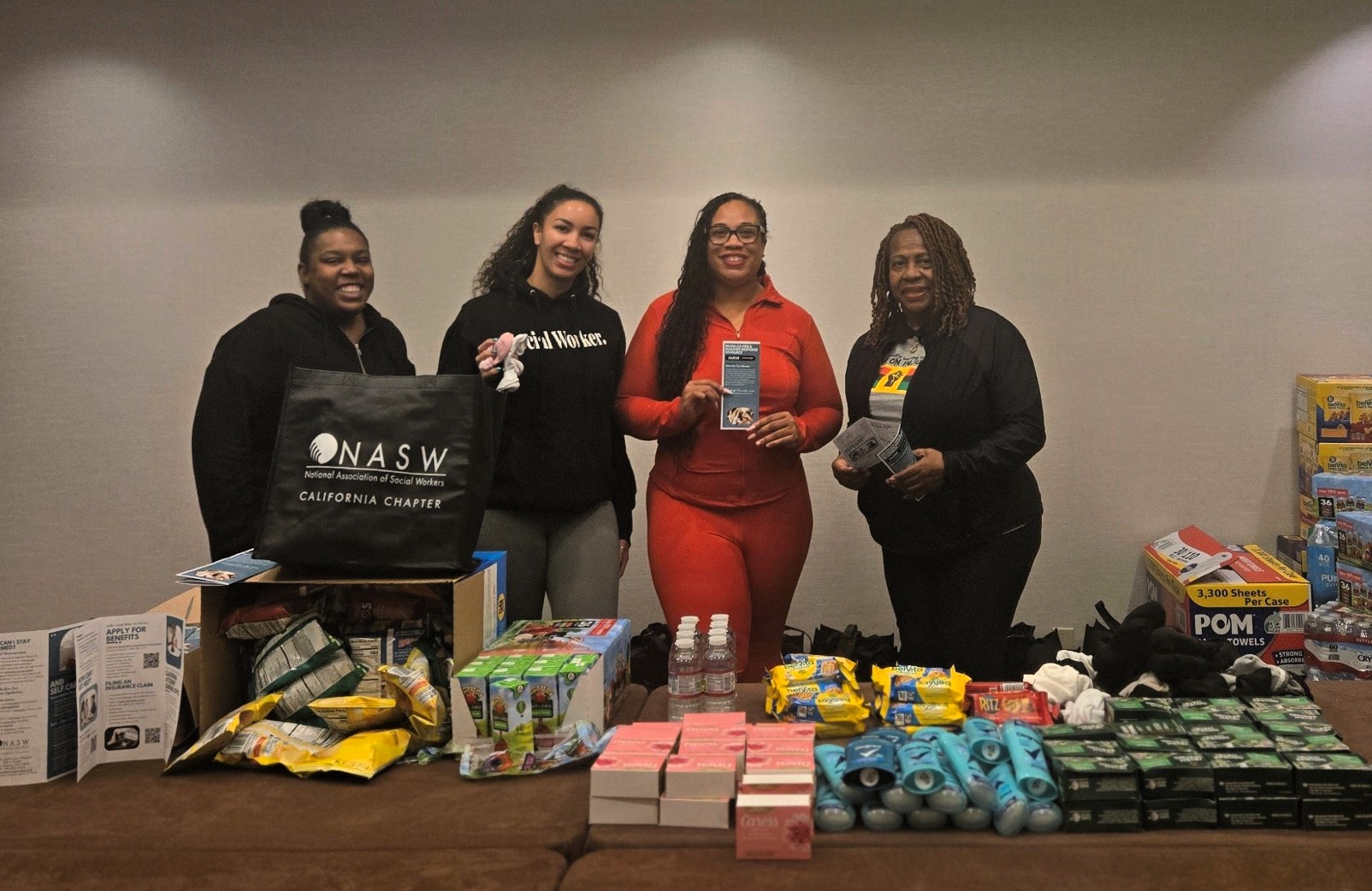 NASW-California hosted a space at the Marriott Long Beach during the wildfires and organized donations for people in need.
NASW-California hosted a space at the Marriott Long Beach during the wildfires and organized donations for people in need.
In January, a series of destructive wildfires hit California’s Los Angeles area, killing at least 29 people, forcing more than 200,000 to evacuate, and destroying or damaging more than 18,000 homes and structures.
“People have lived in these communities for 30 or 45 years and are now displaced and having their whole family and their generational wealth completely gone,” said Kimberly Warmsley, MSW, LCSW, executive director of NASW’s California Chapter. “The impact is so disturbing.”
Warmsley said she was particularly concerned to learn that many evacuees represented communities of color or those who are economically disadvantaged. When the fires began, she started thinking of ways NASW could offer support. She reached out to Gwen Bouie-Haynes, PhD, LMSW, executive director of the NASW Mississippi and Alabama chapters, who volunteered to travel to California to share her expertise in disaster response efforts.
Read the full article.
A Second Trump Term: Coping Strategies for Social Workers
Issue No. 10
Jan. 27, 2025
By Laetitia Clayton

Since Donald J. Trump won the general election in November, many Americans have experienced a range of negative emotions, and social workers are no exception. These feelings include anxiety, depression, fear, helplessness and hopelessness.
Much like during the COVID-19 pandemic, social workers are in the position of helping others cope while also managing their own emotions. In response to this, NASW’s Massachusetts Chapter on Nov. 6 posted a resource on its website called “Coping With Election Stress: An NASW-MA Toolkit.”
“We knew that it was going to be a close election and we knew that our members would be looking for some resources, said Rebekah Gewirtz, MPA, executive director of NASW’s
Massachusetts and Rhode Island chapters. “And we wanted something to share with other chapters and national, so we’re all kind of rowing in the same direction.”
The resource offers tips for discussing the election with clients, practicing self-care and building community, working with marginalized populations to cope with an uncertain future, understanding the relationship between mental health and reproductive rights, and ideas for delving into other forms of political action and advocacy.
Read the full article.
New Trends Revealed in Cannabis and Alcohol Use Disorders
Issue No. 9
Jan. 13, 2025
By Paul R. Pace

Marijuana can be addictive, altering the brain's natural chemical balance and impacting various physiological functions across the body, says Lawrence R. Fishel PhD, LCSW-C, a clinical social work specialist in Towson, Md.
The risk of developing cannabis use disorders increases with higher rates of marijuana consumption.
"Although less physically harmful than some substances, marijuana use can impair cognitive abilities and motivation, leading to decreased memory, performance and interest in healthy pursuits," he states.
Marijuana use can interfere with the diagnosis and treatment of a range of psychiatric conditions, he adds.
Cannabis use disorder is a pattern of cannabis use that leads to clinically significant impairment or distress. For some with this disorder there is a persistent desire or unsuccessful efforts to cut down or control cannabis use. In addition, a great deal of time is spent on activities necessary to obtain cannabis, use cannabis, or recover from its effects.
Fishel shared these details in an NASW Specialty Practice Sections webinar, New Trends in Substance Use Focusing on Alcohol and Cannabis.
Read the full article.
Reducing Recidivism: Social Worker Helps Create Jail Bridge Program in California
Issue No. 8
Dec. 16, 2024
By Paul R. Pace

In the 1970s and 1980s, the U.S. war on drugs spiked the number of mass incarcerations by increasing convictions for nonviolent drug offenses.
In fact, the incarceration rate rose by 1,216%.
“That spearheaded our mass incarceration rate, which continues to plague our country,” says Heather Dunn, DSW, LCSW.
This issue inspired Dunn to examine ways to break the high recidivism rate for incarcerated people who are suffering from mental health issues and other life challenges. She leads the NASW Specialty Practice Sections webinar “Social Work with the Incarcerated Population—A Jail Bridge Program.” It is available here.
Dunn, a behavioral health manager at Kaiser Permanente, works in collaboration with the Sonoma County Jail in Santa Rosa, Calif., to help build a bridge in mental health treatment programs in post incarceration.
Read the full article.
NASW Presents Call to Action in New White House Administration
Issue No. 7
Nov. 18, 2024
By Paul R. Pace

NASW hosted a Facebook Live panel discussion to share concerns and a plan of action after Donald J. Trump was declared the winner of the Nov. 5 presidential election.
An NASW public statement in response to the election results said the association is deeply troubled by comments Trump has made regarding immigrants, women, people who are LGBTQIA2S+, and people of color—and it will challenge any of his policies that harm the nation’s most vulnerable populations.
NASW CEO Anthony Estreet, PhD, MBA, LCSW-C, moderated the “The NASW Post Election Call to Action” discussion. “This is not new for us,” he said. “Social work has its history in civil rights, gender equality, the LGBTQ community, immigration and refugee movements. We are all about this space, advocating for change.”
Read the full article.
NASW-PACE Announces Federal Endorsements for General Election
Issue No. 6
Nov. 4, 2024
By Paul R. Pace

The NASW Political Action for Candidate Election (PACE) board of trustees has made 165 federal endorsements for the Nov. 5 general election.
Thirty-four of the 100 seats in the U.S. Senate are up for regular election. All 435 seats in the U.S. House of Representatives are up for election.
According to NASW-PACE, the goal of any endorsement is to elect candidates who support NASW policy positions and increase visibility for NASW in the process. NASW also gains candidates’ recognition, improves connections with elected officials, advances NASW’s policy agenda, and builds respect for the association as a powerful and committed activist organization.
Read the full article.
Vote 2024: Chapter Field Organizers Help Make a Difference in Battleground States
Issue No. 5
Oct. 21, 2024
By Paul R. Pace

Encouraging social workers and their clients to vote is part of the NASW Code of Ethics, say NASW chapter leaders.
“Voting is a key part of how our democracy functions,” says NASW Ohio Chapter Executive Director Danielle Smith. “It’s essential to social justice. Social justice is a core value of social work practice. It’s a moral and ethical duty for social workers that people have access to voting in a fair way. Helping clients access that is important.”
Ohio is one of five states where NASW has hired PACE (Political Action for Candidate Election) field organizers for this year’s general election. The other states are Michigan, Nevada, Pennsylvania and Wisconsin.
“The field organizer program allows NASW-PACE to reach NASW members in key states to help them register, get involved in campaigns, and vote,” says Dina Kastner, public policy and advocacy manager at NASW national. “It is critical that social workers are active in elections that will determine the fate of our profession and the clients that we serve.”
Read the full story.
Learn How to Respond to Client Requests for Emotional Support Animal Letters
Issue No. 4
Oct. 7, 2024
By Paul R. Pace
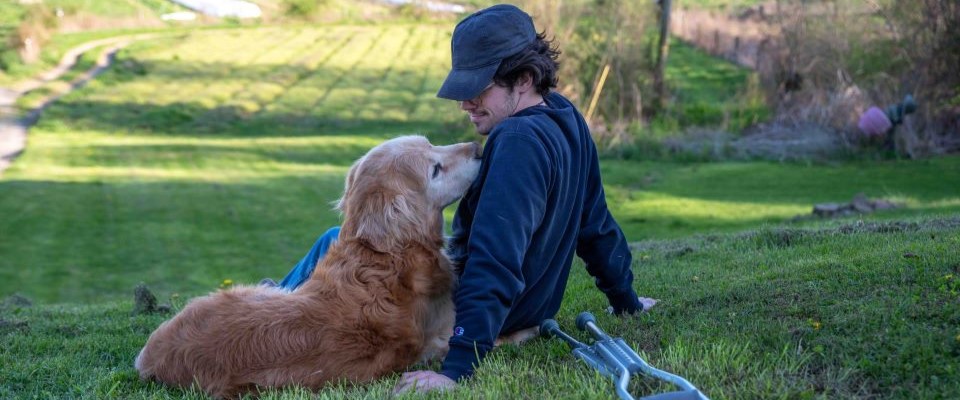
Social work practitioners are increasingly being asked by their
clients to write “Emotional Support Animal (ESA) letters” to verify
eligibility for ESAs as accommodation in rental housing.
Uncertainty on how to respond to such requests creates barriers to
housing access for people facing housing instability who are eligible
for ESA support as a housing accommodation under the U.S. Fair Housing
Act or FHA.
Janet Hoy-Gerlach, PhD, LCSW, LISW-S, director of Veterinary Social
Work Open Door Veterinary Collective, hosted an NASW Specialty Practice
Sections webinar discussing the topic in a presentation called
“Responding Ethically and Competently to ‘Emotional Support Animal’
(ESA) Letter Requests.”
About 66 percent of U.S. households report having at least one
animal. “A majority of those further report that their animal is
family,” Hoy-Gerlach said.
Determining an ESA request is not about being an “animal person,” it’s about being a competent professional, she noted.
Read the
full story.
Social Worker of the Year Juggles Work as Clinician and Maine State Representative
Issue No. 3
Sept. 23, 2024
By Laetitia Clayton
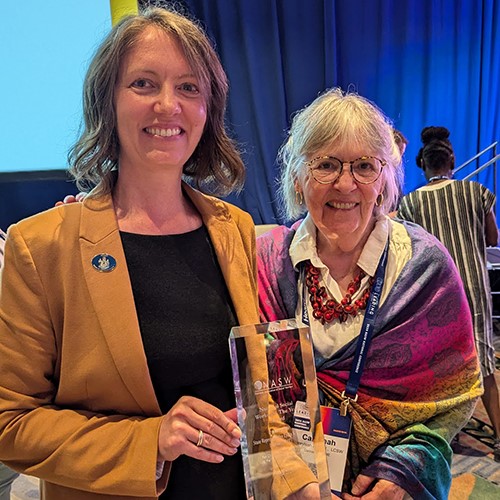
Growing up, Lydia Crafts says the farthest thing from her mind was
becoming a social worker—even though her mother and aunts were social
workers. Or perhaps because of that.
“As an adolescent, I swore I would never become a social worker,” Crafts says, admitting to a bit of a rebellious streak.
Today, Crafts, LCSW, has left that rebelliousness behind and is a
part-time clinical social worker and a Maine state
representative—combining the micro and macro aspects of the profession.
NASW chose her as its 2024 Social Worker of the Year for her
behavioral health care work with children and also as a state legislator
focusing on “strengthening Maine’s behavioral health infrastructure,
increasing access to services, and promoting a strong workforce.”
Crafts says her mother, Careyleah MacLeod, also an LCSW, inspired her
to choose the social work profession, adding that she deeply admired
the compassion her mother showed on her own social work path. Read the
full story.
Congressional Briefing Outlines Need for Social Workers and Youth Behavioral Health Programs
Issue No. 2
Sept. 9, 2024
By Paul R. Pace
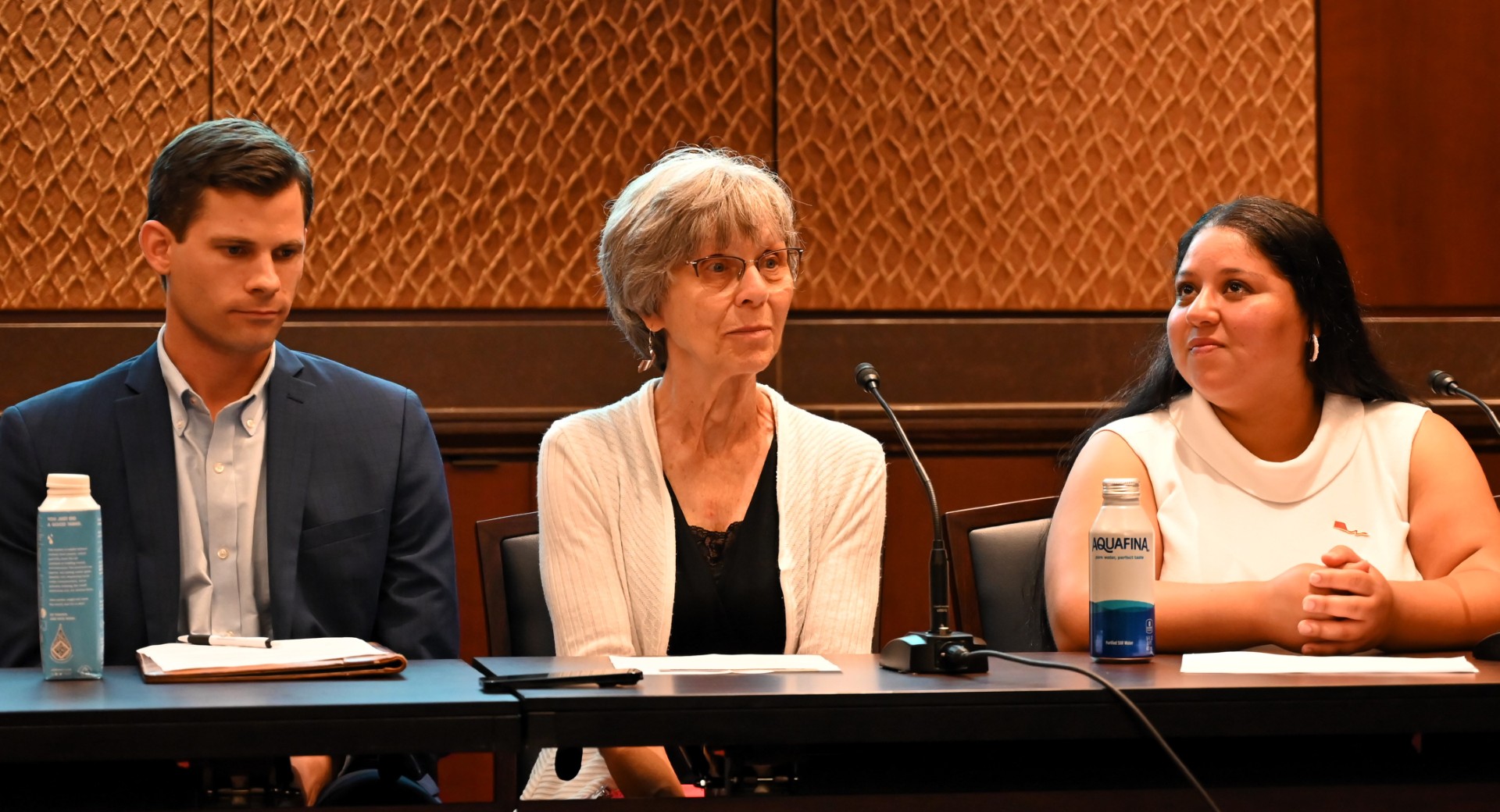
Graciela Chavez of North Carolina is a single mom to her son,
Angel, whom she had at age 15. After graduating from high school, Chavez said
she had little to no support. Compounding this problem was her son’s struggle
with behavioral and mental health issues.
Angel was eventually referred to the Youth Villages Intercept
program, an intensive in-home services program that helped Chavez and her son.
Once Chavez met Angel’s intercept specialist, she said she realized she was
there to help.
“She gave us the tools we needed to overcome some pretty tough
obstacles,” Chavez said. “Through this program, my son was able to learn to
identify triggers and come up with strategies on how to properly manage those
triggers. He learned how to express his emotions. He learned how to work with
challenging cognitive distortions.”
Chavez offered her comments at a congressional briefing on
Capitol Hill called “Rooted in Change: Cultivating Youth Behavioral Wellness at
Home and in Communities.”
Read the
full story.
Social Work is Political
Issue No. 1
Aug. 26, 2024
By Paul R. Pace
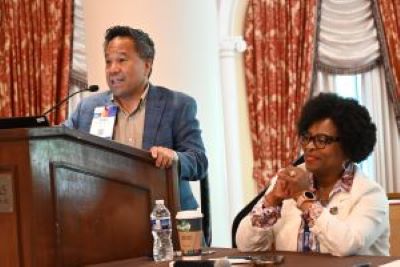
“At the end of the day, politics is not a spectator sport,” NASW CEO Anthony Estreet, PhD, MBA, LCSW-C, said during a presentation at NASW’s national conference in June.
Panelists for the preconference workshop—“Social Work is a Political Profession”— outlined why it’s important for social workers to be involved in the political arena.
Sherron Wilkes, DSW, MSW, program director and clinical assistant professor at the University of Alabama, pointed out the NASW Code of Ethics lays the groundwork for what social workers do, including engaging in social and political action that seeks to ensure all people have equal access to the resources and opportunities that meet their basic needs and to develop fully.
“Politics is social work with power,” she said.